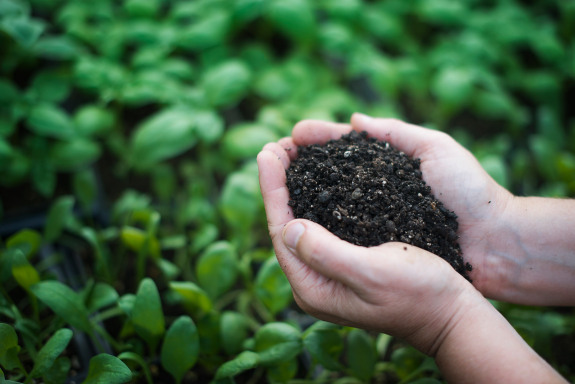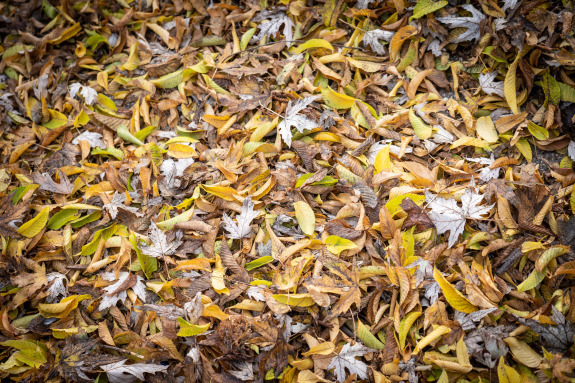Organic waste
From waste to valuable compost
Organic waste becomes valuable compost. A cycle copied from nature makes it possible. Fruit and vegetable peelings, faded flowers and shrub cuttings are too good for the residual waste bin and are irretrievably lost there. Collected in the organic waste bin, they are composted and improve the soil. Learn more about the proper handling of organic waste.
Separated from household waste
Organic waste is collected separately from normal household waste. The organic waste collected separately in the brown organic waste bin thus does not end up unused in the residual waste, but is turned into valuable compost in a composting plant.
This compost is suitable for improving garden soil and for planting flower boxes, tubs and raised beds. This closes a natural cycle. Waste is turned into a new, high-quality product.
Frequently asked questions
What belongs in the organic waste bin?
-
Bread
- and cake scraps egg
- shells cooked
- fish and meat scraps, bones, food waste coffee grounds
- , tea bags compostable
- small animal litter leaves
- , lawn cuttings, branch and shrub cuttings, wild herbs salad, vegetables and fruit (including citrus fruits) decayed
- flowers
How do I prevent odours and maggot infestation?
Ways to prevent unpleasant odours and maggots are:
- Place the organic waste bin in a cool and shady place if possible
- Make it difficult for flies to access, keep the lid closed
- Wrap kitchen waste, especially bones and fish bones, in newspaper
- Line the pre-sorting container and organic waste bin with crumpled newspaper or egg cartons
- Allow moist waste, such as grass cuttings, to dry out.
- Insert an intermediate layer of crumpled newspaper
- Clean the bin regularly (or have it cleaned)
- Combat maggot infestation
- with rock flour or lime
Can compostable film bags be put in the organic waste bin?
No, compostable film bags have no place in the organic waste bin !
In the composting plant, they disrupt the rapid composting of organic waste. What's more, most of them only break down into smaller microplastic particles, but do not decompose into high-quality humus.
You can find more information here: https://www.wirfuerbio.de/egw/
How high are the fees for the organic waste bin?
You can find a list of charges on our waste collection page. (click here)
What do I need to consider in summer?
High temperatures can lead to unpleasant odours and vermin infestation. The following tips can help to prevent this:
- Place the organic waste bin
- in a cool and shady place if possible.
- Make it difficult for flies to access, keep the lid closed. Wrap kitchen waste
- , especially bones and fish bones, in newspaper.
- Line the pre-sorting container
- and organic waste bin with crumpled newspaper or egg cartons.
- Let moist
- waste, such as grass cuttings, dry out before disposal.
- Insert an intermediate layer of crumpled newspaper
- . Clean the bin
- regularly or have it cleaned.
- Combat maggot infestation
- with rock flour or lime.
What do I need to consider in winter?
In sub-zero temperatures, organic waste can freeze in the bin, in which case the organic waste bin cannot be emptied or can only be partially emptied.
These tips will help:
- If possible, place the
- organic waste bin in a frost-protected location, e.g. in a garage, the night before emptying
- . Keep the contents of the organic waste bin as dry as possible. Wrap kitchen waste
- in newspaper.
- Mix crumpled
- newspaper into the organic waste.
- Let coffee filters
- dry out a little.
- Loosen frozen waste from the inside of the bin before
- emptying.
Can I also cancel the organic waste bin?
In principle, the organic waste bin is a mandatory bin and every household must be able to keep organic waste separate from other waste. Anyone who can compost organic waste on their own property and utilise the compost on their own property has the option of home composting.
Click here for the page on home composting. (click here)
What happens to the waste in the organic waste bin?
The organic waste collected in Bocholt and other district municipalities is taken to the composting plant of Entsorgungsgesellschaft Westmünsterland and processed there into high-quality compost.
You can find out what to do with your organic waste here:
https://www.egw.de/anlagen-standorte/entsorgungsanlagen/bioabfallkompostierungs-und-vergaerungsanlage/
What do I do with my bulky green waste?
You can find information on this topic on our page on green waste collection. (click here)
Can I get the organic waste bin cleaned?
The regular cleaning of the organic waste bin is an additional service subject to a charge. Information on this can be found on our page on cleaning organic waste bins. (click here)
Where do I put all the leaves in autumn?
As a general rule, leaves also belong in the organic waste bin! If an excessive amount of leaves accumulates, we offer you the seasonal bin.
Click here for information on the leaf bin.
Here you can find all the information about green waste collection.




